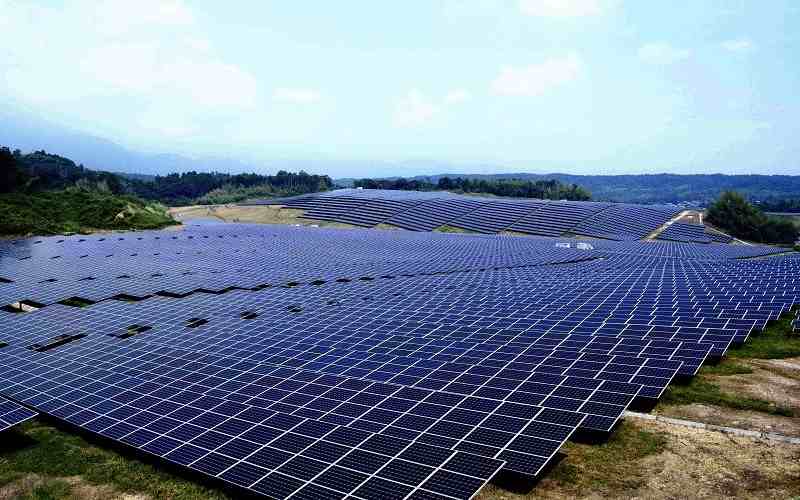
A solar panel farm in Yokkaichi, Mie Prefecture, that covers an area the size of 14 Tokyo Domes
10:56 JST, May 23, 2021
The central government is considering roughly doubling the nation’s solar power generation capacity to more than 100 million kilowatts in fiscal 2030, encouraging local municipalities and businesses to join the effort to significantly increase renewable energy’s slice of the overall power supply pie. However, Japan will still have to clear a number of hurdles on the road toward decarbonization, including a lack of space to physically put solar panels.
Emphasis on renewables

In the nation’s basic energy plan the government aims to revise this summer, the renewable energy share could be raised to 36-38%, about double the 18% level set in fiscal 2019.
Currently, Japan relies on CO2-emitting thermal generators for 76% of its power needs, but the government wants to shift emphasis to renewable energy as it moves toward becoming a decarbonized society.
The government sees solar power as playing a leading role in decarbonization.
While offshore wind is seen as another promising candidate, it is not expected to become a primary power source by fiscal 2030, as the environmental surveys and other procedures involved will take about eight years.
Solar power has already been rolled out widely and the mass production of panels has helped to bring down costs.
According to the Economy, Trade and Industry Ministry, solar power capacity in fiscal 2019 was about 56 million kilowatts, accounting for 6.7% of total power consumption. To reach the 2030 renewable energy target, analysts believe solar capacity will need to grow to more than 100 million kilowatts.
The government plans to consider specific policies to make it easier for solar power companies to install more panels. Local governments are expected to take the initiative by helping select sites for solar panel installation and facilitating discussions with the community over scenery preservation and other issues.
Hunting for space
The number of solar panels grew rapidly after the government introduced a policy in 2012 that mandated renewable energy be purchased at fixed prices over long periods. This so-called feed-in tariff system made Japan’s solar power generation capacity per unit of land — 147 kilowatts per square kilometer — the largest among major countries, well above Germany’s 126 kilowatts and Britain’s 55 kilowatts.
As a result, Japan is running out of land suitable for installing solar panels. Adding 50 million kilowatts of solar power capacity would require installing 50,000 hectares’ (500 square kilometers’) worth of panels, which is not far from the size of Tokyo’s 23 wards (about 630 square kilometers).
Cost is also an issue.
The current feed-in tariff system adds about ¥10,000 per year to the electricity bills of households with average electricity consumption. A government source said that under the current policies, if renewable energy capacity doubles by fiscal 2030, the cost to households could jump to ¥18,000 — a burden that could increase even more if the expense needed to expand the power grid and other factors are taken into account.
Top Articles in Politics
-

Japan PM Takaichi’s Cabinet Resigns en Masse
-

Sanae Takaichi Elected Prime Minister of Japan; Keeps All Cabinet Appointees from Previous Term
-

Japan’s Govt to Submit Road Map for Growth Strategy in March, PM Takaichi to Announce in Upcoming Policy Speech
-

LDP Wins Historic Landslide Victory
-

LDP Wins Landslide Victory, Secures Single-party Majority; Ruling Coalition with JIP Poised to Secure Over 300 seats (UPDATE 1)
JN ACCESS RANKING
-

Japan PM Takaichi’s Cabinet Resigns en Masse
-

Japan Institute to Use Domestic Commercial Optical Lattice Clock to Set Japan Standard Time
-

Israeli Ambassador to Japan Speaks about Japan’s Role in the Reconstruction of Gaza
-

Man Infected with Measles Reportedly Dined at Restaurant in Tokyo Station
-

Videos Plagiarized, Reposted with False Subtitles Claiming ‘Ryukyu Belongs to China’; Anti-China False Information Also Posted in Japan























